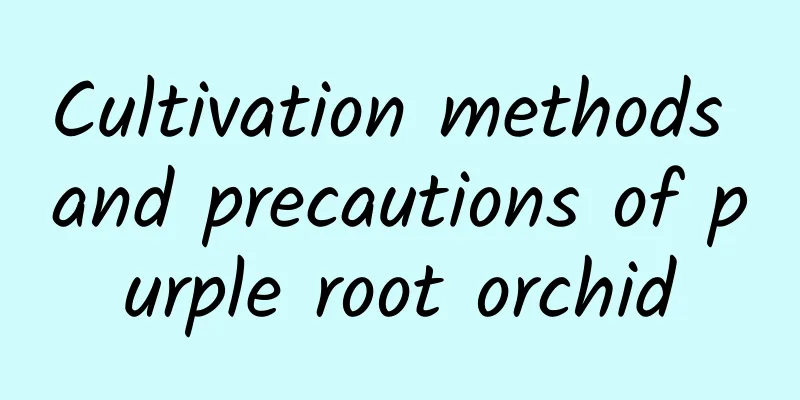Cultivation methods and precautions of purple root orchid

|
Purple root orchid is actually a very easy to grow flower plant. As long as you care for it carefully in the correct way, you will be fine. Generally, you should pay attention to fertilizing the purple root orchid properly, because purple root orchid is a plant that likes fertilizer very much. During the breeding period, it is most appropriate to apply a thin phosphorus fertilizer to the purple root orchid once a month. Be careful not to apply too much fertilizer, otherwise it will easily hinder the growth of purple root orchid. How to grow purple orchid1. Soil Before caring for purple root orchid, we must choose a soil suitable for its growth as a medium. Generally speaking, it is best to choose sandy soil with good drainage and rich in organic matter and humus, which can fully meet the nutrient needs of purple root orchid. 2. Watering Purple root orchid does not require much water. Generally, it only needs to be watered thoroughly every 10-15 days. Be careful not to cause water accumulation in the pot to avoid waterlogging and root rot. This will promote the differentiation of flower buds and allow it to bloom better. 3. Lighting Purple root orchid is a plant that likes sunlight, so it should be placed in a well-lit place for cultivation, but be careful not to place the light too strong. Wait until the sunlight is mild before placing it outdoors for exposure. After summer, it is necessary to provide appropriate shade to avoid burning the leaves due to excessive light. 4. Temperature For purple root orchid, 18-25 degrees Celsius is its best cultivation temperature, which can promote its better growth. If it enters winter, avoid keeping purple root orchid in an environment below 5 degrees Celsius to prevent frost damage. Purple root orchid care precautions1. Reasonable pruning When the purple root orchid is in the growth period, it is necessary to carry out reasonable pruning regularly, cut off the weak and diseased branches, and clean up the withered and necrotic purple root orchids, otherwise a series of disease problems will occur because of them. 2. Timely prevention of damage If the purple root orchid cannot be prevented and controlled in time for diseases and pests, it will grow more and more crooked. For the insects that accompany the purple root orchid, you can use tools to clean them or spray them with medicine to prevent insects. |
<<: Advantages and disadvantages of Abans roses
>>: Advantages and disadvantages of Pinka climbing rose
Recommend
How to grow pepper tree
1. Breeding environment 1. Light: When it is grow...
The most auspicious plants in the living room
1. Money Chain Money tree is a succulent plant th...
How many times a year can radish be planted? How many months does it take to harvest (growing period)?
How many seasons can radish be planted in a year?...
Time and method of changing the soil of plum blossoms
Plum blossom soil replacement time The plum bloss...
Where is the best place to plant Brazilian cherry trees?
Where Brazilian Cherry Trees Are Grown Brazilian ...
Is Aloe Vera a shade or sun-loving plant?
Does Aloe prefer shade or sun? Aloe vera is a sun...
What is the function of Fulutong
Feng Shui Effects of Phlox As a popular foliage p...
The efficacy and contraindications of lettuce
1. Efficacy and Function 1. Improve digestion Let...
Plantings that will not worry about sales in 2022 (What planting industry has the best prospects and is easy to sell)
What to plant in 2022? If you want to earn higher...
When is the best season to plant chives?
Leek planting season and time Leek generally refe...
How to propagate Jade Plant
The sowing propagation method of Jade Leaf The mo...
Is cactus easy to grow?
1. Is it easy to raise? Cactus is a very drought-...
How to propagate the succulent Lover's Tears and what to pay attention to
How to breed succulent lover's tears The ways...
What to do if the gold finger root rots
Causes of root rot Overwatering Golden Finger is ...
Does black bone tea prefer yin or yang?
Does black bone tea prefer yin or yang? Black tea...









